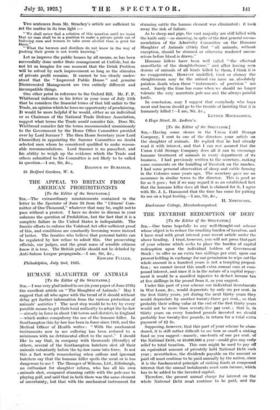HUMANE SLAUGHTER OF ANIMALS
[To the Editor of the SPECTATOR.] SIR,—I was very glad indeed to see (in your paper of June 27th) the excellent article on " The Slaughter of Animals." May I suggest that all who agree with the trend of it should without delay get further information from the various protection of animals' societies ? The next step would be to try by every possible means to get their local authority to adopt the by-law —already in force in about 140 towns and districts in England —which makes compulsory the use of the humane killer. In Southampton this by-law has been in force since 1916, and the Medical Officer of Health writes : " With the mechanical instruments now in use suffering has been reduced to a minimum with no detrimental effect to the meat." I should like to say that, in company with thousands (literally) of others, several of the Southampton butchers shot all their animals voluntarily before the by-law came into force. Is not this a fact worth remembering when callous and ignorant butchers say that the humane killer spoils the meat or is too dangerous to use ? The Manager of Wilsons, Ltd., Edinburgh, an enthusiast for slaughter reform, who has all his own animals shot, compared stunning cattle with the pole-axe to playing golf, and said that in both there was the same element of uncertainty, but that with the mechanical instrument for stunning cattle the human element was eliminated : it took away the risk of failure.
As to sheep and pigs, the vast majority are still killed with the knife only—no stunning, in spite of the first general recom- mendation of the Admiralty Committee on the Humane Slaughter of Animals (1904) that all animals, without exception, should be stunned or otherwise rendered uncon- scious before blood is drawn."
Humane killers have been well called " the effectual anaesthetic of the slaughterhouse," and after having seen dozens of animals of all kinds killed by them, I think it is no exaggeration. However unskilled, tired or clumsy the slaughterman may be the animal can have an .absolutely painless death when these " instruments of precision " are used. Surely the time has come when we should no longer tolerate the very uncertain pole-axe and the always painful knife.
In conclusion, may I suggest that everybody who buys meat and bacon should go to the trouble of insisting that it is humanely killed ?—I am, Sir, &c., LETTICE MACNAGIITEN. 6 Hope Street, St. Andrew's.


























































 Previous page
Previous page